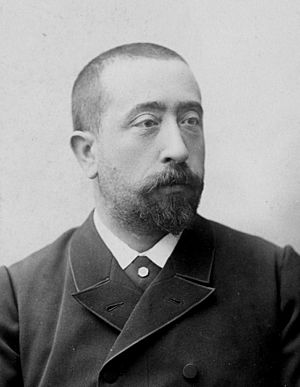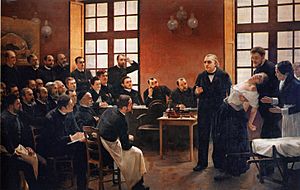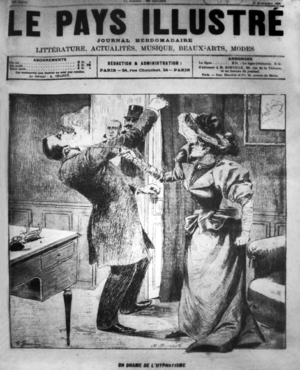Georges Gilles de la Tourette facts for kids
Quick facts for kids
Georges Gilles de la Tourette
|
|
|---|---|
 |
|
| Born |
Georges Albert Édouard Brutus Gilles de la Tourette
30 October 1857 Saint-Gervais-les-Trois-Clochers, Vienne, France
|
| Died | 22 May 1904 (aged 46) |
| Known for | Namesake of Tourette syndrome |
Georges Albert Édouard Brutus Gilles de la Tourette (French: [ʒɔʁʒ albɛʁ edwaʁ bʁytys ʒil də la tuʁɛt]; 30 October 1857 – 22 May 1904) was a French doctor who studied the brain and nervous system. He is famous because a condition called Tourette syndrome is named after him. This condition causes people to have sudden, quick movements or sounds called tics.
Contents
Early Life and Education
Georges Gilles de la Tourette was born on October 30, 1857. He was the oldest of four children. His family lived in a small town in France called Saint-Gervais-les-Trois-Clochers.
When he was just 16 years old, in 1873, he started studying medicine in a city called Poitiers. Later, in 1881, he moved to Paris. There, he continued his medical studies at the Laennec Hospital.
His Medical Career

In 1884, Gilles de la Tourette started working as an intern. He worked very hard, writing articles, teaching, and seeing patients. He became a student and assistant to a very important doctor named Jean-Martin Charcot. Charcot was the director of the Pitié-Salpêtrière Hospital in Paris. He helped Gilles de la Tourette a lot in his career.
Gilles de la Tourette studied and gave talks about different topics. These included psychotherapy (talking to help mental health), hysteria (a term used then for certain emotional or physical problems), and hypnosis. People who knew him said he was very smart, but sometimes a bit grumpy.
Discovering Tourette Syndrome
In 1884, Dr. Charcot asked Gilles de la Tourette to study problems with movement. At that time, doctors had heard about unusual conditions like latah and the Jumping Frenchmen of Maine. Gilles de la Tourette thought these conditions might be connected. He also believed they were different from other movement disorders.
He carefully studied the symptoms of a patient who had what we now call Tourette syndrome. He also looked at notes from other doctors who had seen similar cases before. In 1885, he wrote about nine more cases. He called this new disorder maladie des tics, which means "illness of tics."
Dr. Charcot was very impressed with his work. He decided to rename the condition "Gilles de la Tourette's illness" to honor him. This is why we call it Tourette syndrome today.
Later Life and Challenges
Gilles de la Tourette got married to his cousin, Marie Detrois, on August 2, 1887. They had four children together. Three of their children lived to be adults.
In 1893, something very difficult happened. A former patient shot Gilles de la Tourette in the neck. She claimed that one of his co-workers had hypnotized her against her will. Around the same time, his mentor, Dr. Charcot, passed away. Also, his young son died.
Even though he got better from the shooting and kept working, these sad events affected him deeply. After 1893, his mental health became worse. He eventually had to stop working. He passed away on May 22, 1904, in Switzerland.
Writings
Gilles de la Tourette wrote many papers and books during his career. He published 16 papers about hysteria, and other medical topics. Some of his important writings include:
- Les actualités médicales, les états neurasthéniques (Paris 1898)
- Leçons de clinique thérapeutique sur les maladies du système nerveux (Paris 1898)
- L'hypnotisme et les états analogues au point de vue médico-légal (Paris, 1887; 2nd. edition Paris 1889)
- Traité clinique et thérapeutique de l'hystérie d'après l'enseignement de la Salpêtrière (Paris 1891)
See also
 In Spanish: Georges Gilles de la Tourette para niños
In Spanish: Georges Gilles de la Tourette para niños
 | Delilah Pierce |
 | Gordon Parks |
 | Augusta Savage |
 | Charles Ethan Porter |


